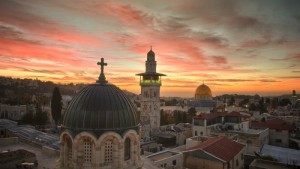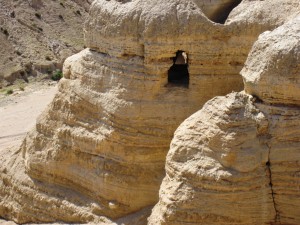Why pilgrimage is of such paramount importance
By Charles Gardner
DONCASTER, UK (ANS) — I was thinking about the Feast of Tabernacles when I booked my train ticket to London and was rather tickled by the Virgin Trains slogan “Be bound for glory,” obviously based on the traditional gospel hit, This Train. If it means Virgin boss Sir Richard Branson is spreading the good news, who’s complaining?
I was making a pilgrimage to see my mum, but I was also mindful of Sukkot, one of three festivals for which the ancient Israelites were required to visit Jerusalem (Leviticus 23) and which, in the millennial reign of Messiah, every nation will be required to make (Zechariah 14.16). I was particularly thinking about pilgrimage at the time because of reports of a downturn in Israel tour bookings from the UK due to the pound’s drop in value against the dollar.
Many Christians I have known over the years have taken the view: “God can meet me here, where I am. Why should I go over there where God is apparently pouring out his Spirit in a special way?” Yet there is a great emphasis in the Bible on places that are made special by God’s extraordinary presence. Jerusalem is obviously the best earthly example. Even atheist TV documentary maker Simon Reeve, on arriving in the city, said it took his breath away. It did that for this journalist too and I can well understand the exiled psalmist’s feelings as he considered Jerusalem his “highest joy” (Psalm 137.6).
By the way, UNESCO’s denial of Jewish ties to what another psalm referred to as “the joy of the whole earth” (Psalm 48.2) would be laughable were it not so tragic. But my ‘train of thought’ is getting off track.
Even the Wise Men of the nativity travelled some 1,000 miles to worship the Christ-child. The pioneers of the modern-day Pentecostal movement travelled halfway round the world back in 1906 to catch something of what God was doing at Azusa Street, Los Angeles. And I regularly took a 210-mile round trip for evening services in Sunderland when fresh stirrings of the Holy Spirit broke out there in 1994.
There is no doubt that tours of the Holy Land bring the Bible to life and, though of course I understand that economic, security and other considerations will adversely affect bookings, there is clearly a need for a sharper focus on the important nature of such pilgrimage, which should be seen as a further expression of our Christian journey, of reaching deeper into God’s wells of salvation and unearthing the treasures of His precious land.
In celebrating God’s bountiful harvest and, in building temporary shelters, we are reminded how He provided for his people in the desert and of how we are only temporary sojourners here on earth, and that our real destiny is “the city that is to come” (Hebrews 13.14). And we remember how Yeshua came to ‘tabernacle’ with us (John 1.14).
As with all discipleship, there is sacrifice — in terms of cost and effort — in pilgrimage. And we should surely take heed of Solomon’s wisdom, that “whoever watches the wind will not plant; whoever looks at the clouds will not reap.” (Ecclesiastes 11.4) In other words, don’t wait until all the conditions are in perfect alignment. If pilgrimage is a passport to meet with God in a deeper way, it will surely be well worth it. Be bound for glory!










